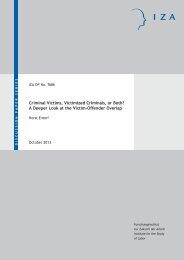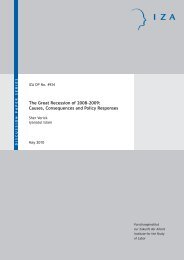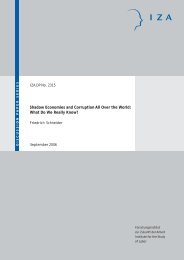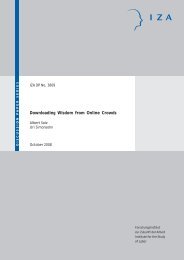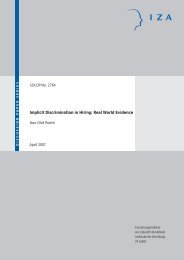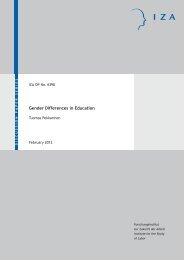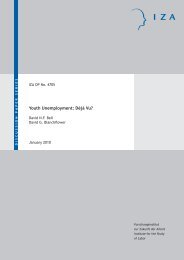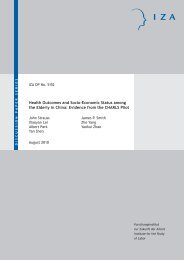Limited Self-Control, Obesity and the Loss of ... - Index of - IZA
Limited Self-Control, Obesity and the Loss of ... - Index of - IZA
Limited Self-Control, Obesity and the Loss of ... - Index of - IZA
Create successful ePaper yourself
Turn your PDF publications into a flip-book with our unique Google optimized e-Paper software.
analysis, we address issues <strong>of</strong> causality. In particular, we take into account whe<strong>the</strong>r people<br />
turn to eating when <strong>the</strong>y feel depressed.<br />
In sum, <strong>the</strong> proposed strategy combines <strong>the</strong> idea <strong>of</strong> exploiting supplementary information on<br />
<strong>the</strong> variation in a person’s level <strong>of</strong> will power <strong>and</strong> <strong>the</strong> idea <strong>of</strong> an ex post evaluation based on<br />
experienced utility. This is seen as <strong>the</strong> main conceptual point <strong>of</strong> <strong>the</strong> paper. In <strong>the</strong> concrete<br />
empirical application presented in Section III, ‘old’ <strong>and</strong> ‘new’ approaches to study self-<br />
control problems are applied in a complementary way.<br />
C. Previous evidence on obesity <strong>and</strong> subjective well-being<br />
Reported subjective well-being provides information about people’s evaluation <strong>of</strong> <strong>the</strong>ir<br />
situation after <strong>the</strong>y have decided about <strong>the</strong>ir food <strong>and</strong> beverage consumption. Two predictions<br />
summarize <strong>the</strong> conflicting views on <strong>the</strong> role <strong>of</strong> limited will power in obesity. If technical<br />
“progress” in producing fatty food is indeed a major driving force behind obesity, <strong>the</strong><br />
st<strong>and</strong>ard economic model predicts that individuals will become heavier <strong>and</strong> happier.<br />
However, if individuals have self-control problems, we would expect <strong>the</strong>m to become heavier<br />
<strong>and</strong> less happy.<br />
There is a growing literature on empirical research, studying whe<strong>the</strong>r obese people are less<br />
satisfied. According to an empirical investigation for roughly 8,000 young women, obesity is<br />
related to lower satisfaction with work, family relationships, partner relationship <strong>and</strong> social<br />
activities (but not satisfaction with friendships) (Ball et al. 2004). O<strong>the</strong>r studies report<br />
correlations between obesity <strong>and</strong> symptoms <strong>of</strong> depression, whereby <strong>the</strong> risk <strong>of</strong> depression is<br />
higher for obese women than obese men (e.g. McElroy et al. 2004; Needham <strong>and</strong> Crosnoe<br />
2005). These findings, however, provide only limited insights, as <strong>the</strong> correlations can be due<br />
to third variables affecting both eating behavior <strong>and</strong> subjective well-being, or because low life<br />
satisfaction <strong>and</strong> stress can lead to obesity. The latter has been studied in a longitudinal<br />
analysis for 5,867 pairs <strong>of</strong> twins (Korkeila et al. 1998). It is found that a high level <strong>of</strong> stress,<br />
as well as a low level <strong>of</strong> life satisfaction, are both predictors <strong>of</strong> weight gain over six years <strong>and</strong><br />
for certain groups <strong>of</strong> people over 15 years <strong>of</strong> age. Ano<strong>the</strong>r panel study addresses <strong>the</strong> reverse<br />
relationship. Taking baseline mental health into account, it analyzes <strong>the</strong> long term<br />
consequences <strong>of</strong> obesity, finding an increased risk for depression (Roberts et al. 2002). These<br />
results are valuable to assess <strong>the</strong> relevance <strong>of</strong> <strong>the</strong> phenomenon, but <strong>the</strong>y have to be<br />
supplemented with fur<strong>the</strong>r evidence to identify <strong>the</strong> contribution <strong>of</strong> self-control problems to<br />
<strong>the</strong> link between obesity <strong>and</strong> subjective well-being.<br />
10



